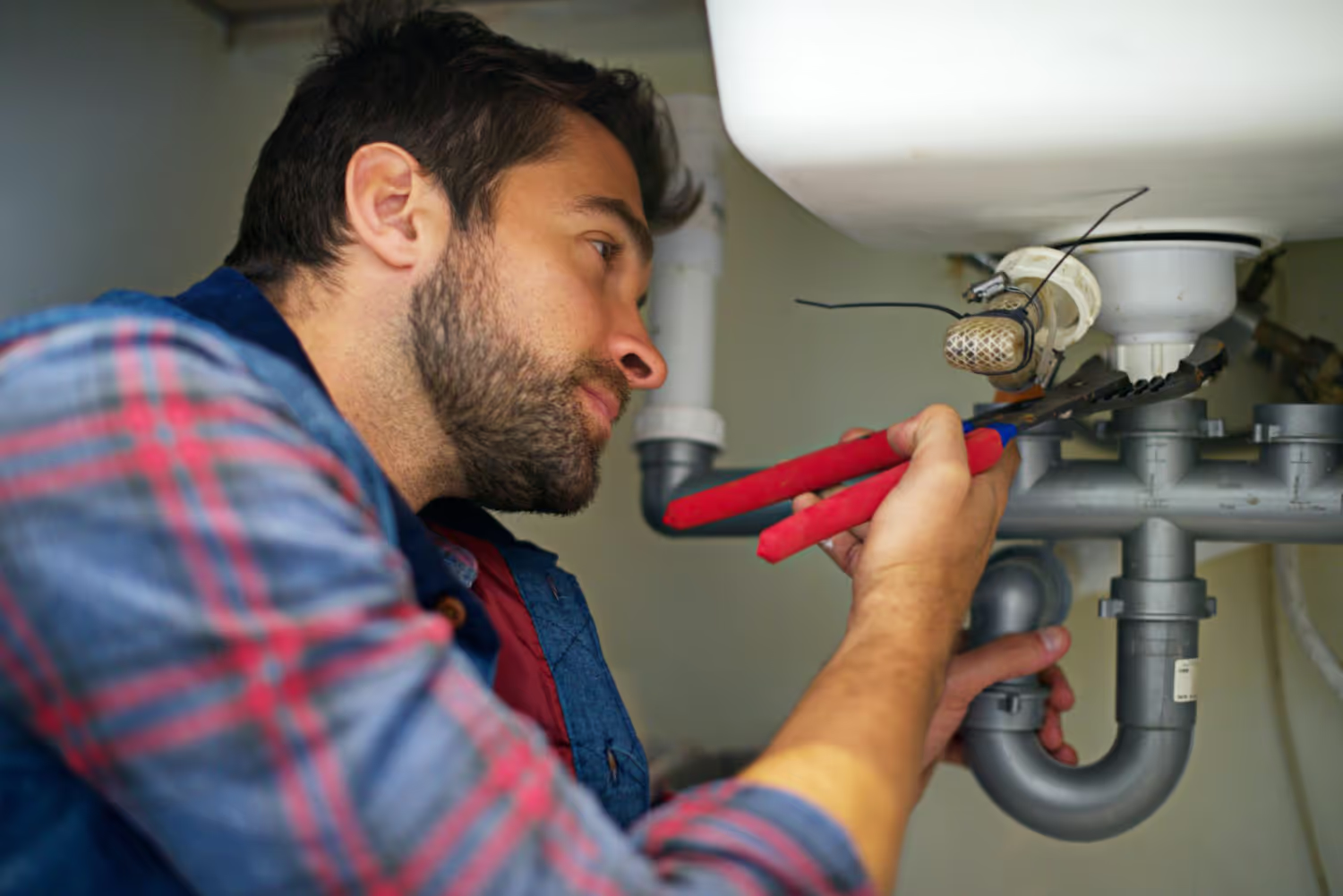


FREE Water Heater
With every whole house repipe purchase. Free brand-new water heater or credit towards a tankless water heater.
.svg)
.svg)
.svg)
.svg)



With every whole house repipe purchase. Free brand-new water heater or credit towards a tankless water heater.
.svg)
.svg)
.svg)
.svg)

Your home's plumbing system works behind the scenes every day, but when something goes wrong, it can quickly become a major headache. Most property owners feel overwhelmed when faced with leaks, clogs, or broken pipes, often unsure whether to attempt a fix themselves or call a professional.
Understanding basic plumbing repairs and maintenance can save you hundreds of dollars while preventing water damage and costly emergencies. We'll guide you through the most common plumbing issues, help you understand repair costs, and show you when it's safe to handle problems yourself versus when you need expert help.
In this article, you’ll learn how to approach plumbing and repairs with confidence—from diagnosing common issues to estimating costs and choosing a trusted local pro.
Here’s what you’ll find below:
Whether you're dealing with a dripping faucet or planning ahead for future maintenance, this guide covers everything from identifying common problems to choosing the right professional when needed.
Our straightforward approach will give you the confidence to make smart decisions about your home's plumbing system.
Property owners face plumbing issues that range from simple fixes to major system failures. Knowing what repairs involve and recognizing common problems helps us make smart decisions about when to call professionals.
Plumbing repair involves fixing problems in our water supply and waste removal systems. This includes pipes, fixtures, and connections throughout our property.
Most repairs fall into two categories: emergency fixes and preventive maintenance. Emergency repairs handle sudden problems like burst pipes or complete blockages. Preventive maintenance addresses small issues before they become major problems.
We should understand the difference between repairs we can handle and those requiring professional help. Simple tasks include:
Complex repairs need professional attention. These include pipe replacement, sewer line issues, and water heater problems. Attempting these repairs without proper knowledge can cause more damage and higher costs.
The key is knowing our limits. Small leaks might seem easy to fix, but they often indicate bigger problems in our plumbing system.
Gainesville plumbers see the same problems repeatedly in local properties. Understanding these common issues helps us spot them early.
Drain clogs top the list of frequent calls. Kitchen sinks get blocked by grease and food particles. Bathroom drains clog with hair and soap buildup. These blockages often start small but grow worse over time.
Toilet problems rank second. Running toilets waste water and increase bills. Weak flushes indicate internal part failures. Complete blockages require immediate attention.
Leaky faucets seem minor but waste significant water. A single dripping faucet can waste over 3,000 gallons per year. Most leaks come from worn washers or O-rings.
According to the U.S. EPA’s WaterSense program, common household leaks, including dripping faucets, can waste nearly 10,000 gallons of water per year, and about one in ten homes has leaks wasting 90 or more gallons each day
Water pressure issues affect daily activities. Low pressure usually means clogged aerators or pipe problems. High pressure can damage fixtures and appliances.
Hot water problems disrupt our routines. Water heaters fail due to age, sediment buildup, or faulty heating elements. Gas units may have pilot light issues.
Water damage costs property owners thousands of dollars when plumbing problems go unfixed. Small leaks grow into major flooding events that destroy floors, walls, and personal belongings.
Hidden leaks cause the most expensive damage. Pipes inside walls or under floors leak for months without detection. By the time we notice water stains or soft spots, extensive damage has occurred.
Mold growth follows water damage within 24-48 hours. Mold remediation requires professional treatment and can cost more than the original plumbing repair.
Structural damage happens when water weakens building materials. Wood rots, drywall crumbles, and metal fixtures corrode. These repairs often require permits and major construction work.
Insurance complications arise from delayed repairs. Many policies exclude damage from long-term leaks or maintenance issues. Quick action protects our coverage and reduces claim disputes.
Acting fast saves money. A $150 faucet repair prevents thousands in flood damage. Regular inspections help us catch problems before they cause serious harm to our property.
Faucet drips, slow drains, and pipe breaks account for most plumbing calls we see in homes. These three issues can range from minor annoyances to major water damage if not handled quickly.
Leaky faucets waste thousands of gallons per year and drive up water bills. The main causes are worn washers, damaged O-rings, or faulty valve seats.
Common signs include:
Most faucet leaks happen because rubber washers get old and crack. We can usually fix this by turning off the water supply and replacing the washer.
O-rings also wear out over time. These small rubber rings sit inside the faucet and create a seal. When they fail, water leaks around the handle base.
Tools needed for basic repairs:
Cartridge faucets have different parts that can break. The cartridge itself might need replacement if cleaning doesn't work.
Clogged drains happen in every home and start with hair, soap, food, and grease buildup. Kitchen sinks get blocked by food scraps and cooking oils that harden in pipes.
Bathroom drains collect hair and soap scum. Over time, this creates thick clogs that stop water flow completely.
Warning signs of drain problems:
We can clear most clogs with simple tools. A plunger works well for toilet clogs and some sink blockages.
Drain snakes reach deeper into pipes to break up tough clogs. These metal cables twist through pipes and grab debris.
Avoid these common mistakes:
Hot water and dish soap can help clear grease clogs in kitchen sinks. Pour very hot water down the drain first, then add soap.
Burst pipes create water damage fast and need immediate action. Cold weather, old pipes, and high water pressure cause most pipe breaks.
Emergency steps for burst pipes:
Small pipe leaks often start around joints and fittings. We might see water stains on walls or ceilings before finding the actual leak.
Pipe materials matter for repair methods. Copper pipes need different fixes than PVC or steel pipes.
Temporary fixes until help arrives:
Water pressure that's too high puts stress on all pipes. Normal home pressure should stay between 40-60 PSI.
Frozen pipes burst when ice expands inside them. This happens most often in crawl spaces, attics, and exterior walls.
Plumbing repair costs range from $50 for simple fixes to thousands for major system repairs. The final price depends on the problem type, materials needed, and your location's labor rates.
Several key factors determine what you'll pay for plumbing repairs. The type of problem makes the biggest difference in cost.
Simple vs. Complex Repairs Basic issues like leaky faucets or minor clogs cost less than major pipe replacements. Emergency calls during nights or weekends add extra fees to your bill.
Location and Accessibility Pipes hidden behind walls or under concrete slabs cost more to repair. We need extra time and tools to reach these areas safely.
Materials and Parts Standard parts cost less than specialty fixtures or high-end materials. Copper pipes cost more than PVC, but they last longer in most situations.
Labor Rates by Region Urban areas typically charge higher rates than rural locations. Local demand for plumbers also affects pricing in your area.
Different plumbing problems come with different price ranges. We've broken down typical costs for the most common repairs.
According to Forbes Home, hiring a plumber typically costs $45–$200 per hour, depending on job complexity, location, and whether the call is after hours.
Repair Type
Average Cost Range
Leaky faucet
$75 - $200
Clogged drain
$100 - $275
Running toilet
$150 - $300
Pipe leak repair
$200 - $600
Water heater repair
$300 - $800
Main line issues
$1,000 - $4,000
Small Repairs Most homeowners pay between $100-$300 for basic fixes. This includes fixing drips, clearing simple clogs, or replacing worn parts.
Medium Repairs Pipe repairs and fixture replacements typically cost $300-$800. These jobs require more time and specialized tools to complete properly.
Major Repairs Sewer line problems or whole-system replacements can cost thousands. These complex jobs often need permits and multiple days to finish.
Local plumbers provide the most accurate pricing for your specific situation. They understand regional costs and can inspect your problem firsthand.
Accurate Problem Assessment A plumber nearby can visit your home to see the actual problem. Phone estimates often miss important details that affect the final cost.
Regional Price Knowledge Local professionals know current material costs and permit requirements in your area. This knowledge leads to more precise estimates for your project.
Reduced Travel Costs Nearby plumbers charge less for travel time and emergency calls. Distance affects both response time and total service costs.
Multiple Estimate Benefits Getting 2-3 estimates helps you understand fair pricing for your repair. Compare both costs and proposed solutions before making your decision.
Finding the right plumber means looking for specific qualities that ensure quality work and fair pricing. Working with local professionals offers faster response times and better service, while knowing red flags helps you avoid costly mistakes.
Proper licensing and insurance are the first things we should verify. Licensed plumbers have completed training and passed required tests. Insurance protects us if something goes wrong during the repair.
Experience with similar problems matters greatly. We want plumbers who have handled our specific issue before. Ask how long they have worked in the field and what types of repairs they do most often.
Clear communication shows professionalism. Good plumbers explain the problem in simple terms. They tell us what needs fixing and why. They also provide written estimates before starting work.
References from other customers help us make smart choices. We can ask for contact information of recent customers. Online reviews also give us insight into their work quality and customer service.
Fair pricing is important but not always the cheapest option. Reliable plumbers charge reasonable rates for their area. They break down costs clearly and do not surprise us with hidden fees.
Quick response times are a major advantage of local plumbers. A plumber nearby can reach us within hours instead of days. This matters most during emergencies like burst pipes or severe leaks.
Lower travel costs help keep our bills reasonable. Local professionals spend less time and money getting to our property. They often pass these savings on to us through lower service fees.
Knowledge of local codes ensures proper repairs. Gainesville plumbers know local building rules and permit requirements. This prevents problems during inspections or when we sell our property.
Established community reputation makes local plumbers more accountable. They rely on word-of-mouth referrals from neighbors. Poor work can hurt their business in ways that affect distant plumbers less.
Ongoing relationships benefit us over time. Local plumbers remember our property and past repairs. This helps them work faster and spot potential problems early.
Get multiple estimates before choosing a plumber. We should contact at least three professionals for comparison. This shows us the normal price range for our repair.
Watch for red flags that signal poor service:
Ask detailed questions about the repair process. Good plumbers explain their methods and timeline. They should answer our questions without getting defensive or evasive.
Verify credentials independently rather than trusting their word. We can check licensing through state websites. Insurance companies can confirm coverage directly.
Read contracts carefully before signing anything. All costs, timeline, and warranty information should be written clearly. We should never feel rushed to sign paperwork.
Regular preventive maintenance and scheduled inspections help catch small plumbing issues before they become expensive disasters. Simple maintenance tasks and seasonal checks protect your property from water damage and costly repairs.
We recommend checking water pressure monthly at multiple faucets throughout your property. Low pressure often signals hidden leaks or pipe blockages.
Monthly tasks:
Quarterly tasks:
We suggest keeping drains clear by avoiding grease, coffee grounds, and food scraps. Use drain screens to catch debris before it enters your pipes.
Check your water heater for rust, leaks, or unusual noises every three months. Flush the tank annually to remove sediment buildup that reduces efficiency.
Warning signs to watch:
Spring checks focus on winter damage and preparing for increased usage. We inspect outdoor spigots for freeze damage and test irrigation systems.
Check your sump pump before rainy season arrives. Pour water into the pit to ensure the pump activates properly.
Summer maintenance includes checking for leaks around pools, sprinklers, and outdoor fixtures. High usage can reveal problems that winter hiding.
Fall preparation protects against freezing temperatures. We disconnect and drain garden hoses, shut off outdoor water valves, and insulate exposed pipes.
Winter monitoring involves checking for ice dams, frozen pipes, and ensuring proper heating around plumbing areas. Keep cabinet doors open during cold snaps to warm pipes under sinks.
Schedule a professional plumbing inspection every 2-3 years for newer homes and annually for properties over 10 years old.
Immediate inspection needed when:
We recommend professional inspection before buying property and after major renovations. Inspectors use specialized tools to check pipe condition and water flow.
Professional services include:
Schedule inspections during off-peak seasons when plumbers have more availability and competitive pricing. Spring and fall offer ideal timing for comprehensive plumbing system evaluations.
Professional inspectors can identify problems we might miss, including small leaks inside walls and early signs of pipe deterioration.
Taking care of your plumbing system doesn't have to be scary or hard. We've covered the key basics that every property owner needs to know.
Simple prevention habits can save you money. When your whole family follows good plumbing practices, problems happen less often.
Know your limits when it comes to DIY repairs. Some jobs are perfect for homeowners to handle. Others need a professional plumber right away.
Regular maintenance keeps small problems from becoming big disasters. A few minutes of care each month protects your home for years.
Your plumbing system works hard every day. Taking good care of it protects your comfort, safety, and property value.
Start with one or two simple maintenance tasks this week. Build these habits slowly over time.
We believe every property owner can learn basic plumbing skills. You don't need to become an expert. Just knowing the basics helps you make smart choices about your home.
Good plumbing care is really about being prepared and staying alert to problems early.
Schedule our licensed Gainesville team for on-site diagnostics and same-day plumbing repairs book service now or request a transparent quote.